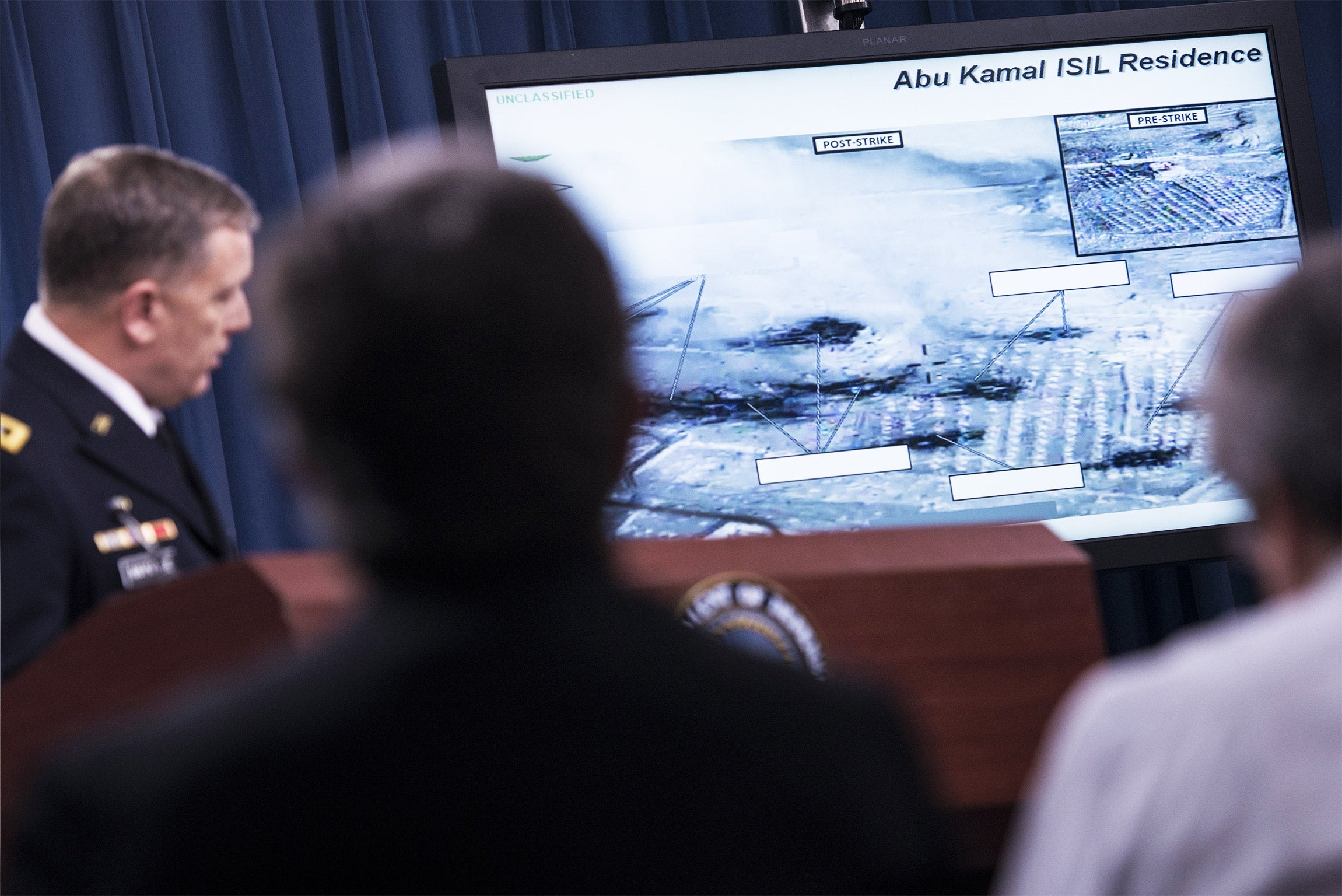Syria conflict: Khorasan return with a fresh influx of fighters awaiting the order to start 'shooting the birds'
America claimed to have seen off the al-Qaeda branch, but Kim Sengupta hears a different story

The time is fast approaching for “shooting the birds”, a phrase now much in use in parts of northern Syria, bringing with it a chilling warning of a new wave of lethal violence about to be unleashed in the country’s savage civil war.
Fighters, including a fresh influx of foreign jihadists, have been seen gathering in bases across the provinces of Idlib and Aleppo. They pledge allegiance to Khorasan, an al-Qaeda branch which was supposedly crippled by American bombing in one of the first days of the air campaign launched against Isis.
The Obama administration maintained at the time that the organisation had been targeted because it posed an imminent threat to the West, although no evidence was offered to support this claim. US officials maintained that Khorasan was not in Syria to take part in the war, but to recruit foreign nationals and train them for attacks in their own countries.
Pentagon officials told US media at the time, September last year, that the eight air strikes had been “very successful”. It subsequently emerged, however, that most of the Khorasan hierarchy, including 35-year-old Muhsin al-Fadhli, a Kuwaiti, and a clutch of top bomb-makers – the prime targets – had got away. The only high-profile casualty was the Turkish commander of the group’s sniping team, Abu Yusuf al-Turki. David Drugeon, a French convert and an explosives expert, was injured but has since recovered, according to Islamist sources.
There were allegations that the Khorasan leadership had been tipped off by sympathisers in the Syrian opposition, some of whose members were critical of the US raids, holding that they weakened the war effort against both Isis and the regime, both of whom Khorasan opposes.
The organisation is now very much involved in Syria’s conflict which has seen rebel groups pitted against each other as well as the regime. Khorasan’s deputy leader, Adel al-Wahabi al-Harbi, from Saudi Arabia, was killed last week in clashes with rival militias, although the exact circumstances of his death remain unclear.
Now, however, there appears to be no shortage of adherents for Khorasan. The American bombing, as well as being relatively ineffective, gave the group a boost in publicity and added to its mystique. Abdulhamid Abu Iyad, a former Jabhat al-Nusra fighter from Aleppo, said: “People didn’t know much about Khorasan, but they gained prestige after that.” He added. “What the Americans were saying… they were master bomb-makers, so dangerous… and then failed to kill them. Al-Turki going was a loss – he was the best sniper – but that is all.
“There are a lot of young people who want to join Khorasan and they are also getting good people from other countries. We keep on hearing that something big will be happening, but no one knows the details except the very top commanders.”
The foreign contingents, including Afghans, Pakistanis and Iraqis, have been going into Syria for the past three months, according to activists who had been monitoring the build-up. A band of Yemenis has come and gone, possibly departing to take part in the sectarian strife between Sunnis and Shias raging in their homeland.
There is apprehension among the dwindling bunch of civil rights campaigners in Syria, who already face violent persecution from Islamist extremists, about the build-up. There is also confusion about who, exactly, the fighters are. Some carry the banner proclaiming Qaeda al-Jihad Bilad al-Sham, a name sometimes used by Jabhat al-Nusra to show that they are true jihadists of Sham – the Levant – rather than Isis. However other, previously unseen, black flags with Koranic script have also appeared.
The fighters have been seen around the town of Atme in northern Idlib province, and others, in small units, are spread across Aleppo province. Isis cut down a 150-year-old oak tree, of great botanical value, in Atme in November 2013, after accusing residents of venerating the tree rather than Allah.
Isis has since lost control of Atme, with the area under the loose control of a group of rebel militias. The newcomers, saying they are Khorasan, keep a low profile in the surrounding countryside. “They haven’t gone to the front line, they are just there waiting, but waiting for what?” wondered Hisham, an activist from Aleppo, who only wanted his first name used.
“A few people we know in Khorasan say they are waiting for the order to start ‘shooting the birds’ and killings would begin. But we don’t know whether they mean civil rights people or officers from the Free Syria Army or what. We hope they will attack Daesh [Isis] but we think they will attack our people as well.”
After seeing the uprising against President Assad turn into fundamentalist jihad-immersed bloodshed, groups of activists have been trying in recent weeks to reassert themselves. The reaction from hardline Islamists has been vicious. A recent demonstration in Aleppo aimed at restating the original values of the uprising against President Assad, which began four years ago, was broken up by Jabhat al-Nusra and its supporters carrying swords.
Dozens of civil society campaigners have been murdered or kidnapped by extremists. “It is so important that we keep speaking up for the values of the revolution: democracy, equality and unity of Syrian people,” said Hisham. “But the extremists say these are atheist values and they try to silence us. What Syria needs is for the revolution to have proper debates; it does not need more armed factions.”
Subscribe to Independent Premium to bookmark this article
Want to bookmark your favourite articles and stories to read or reference later? Start your Independent Premium subscription today.

Join our commenting forum
Join thought-provoking conversations, follow other Independent readers and see their replies